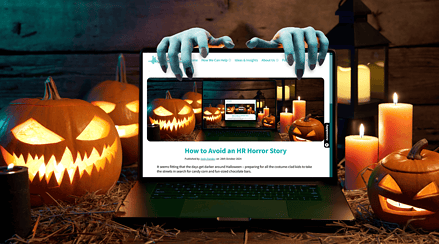Menu

What Do You Do if Your Workplace is Haunted?
Stories of ghosts, ghouls, spirits, and paranormal activity are not hard to come by in the modern world. The media is inundated with gothic movies, tv shows, and literature, and for many people a good ghost story gets their spine tingling.
However, while the idea of ghosts may be entertainment for some, for others, the concept of apparitions, hauntings, and possessions are very real. According to a 2019 IPSOS poll, 46% of Americans believe in ghosts (a percentage that has increased by 14% since 2005). That’s almost half of the entire country.
So I pose you this scenario: what do you do, as an HR professional, if someone in the company believes the workplace is haunted?
Belief is a very powerful force; whether you believe in ghosts or not, for someone that does believe in them, you have to accept that as their reality. This means that while their fear may be intangible, the psychological effects that their fear will have on them are very real.
And there are many instances of hauntings causing chaos in the workplace to prove this. In Orlando, a Japanese restaurateur backed out of his lease because they heard that the premises were allegedly haunted by ghosts and apparitions. The landlord even offered to exorcise the building, but they still refused, and this resulted in a messy court case.
In another occurrence at the Eisenhower Executive Office Building in Washington D.C., many workers reported instances of seeing a woman’s face in a third-floor window. They would also hear a female voice call out their name, followed by footsteps running down the hall – on one occasion they even found a co-workers visiting child talking to an invisible woman in the third-floor conference room. One worker had to quit his job because of this alleged supernatural torment, as he kept finding the photos from his office walls neatly arranged on the floor every morning.
There was even one case of a law firm’s office building being haunted, which lead them to move to a newer building where the unexplained phenomena (keyboards typing by themselves, files shuffling in cabinets in empty rooms) finally ceased.
Whether these hauntings were truly paranormal or not, the effects of them are undeniably real: legal issues, lowered engagement and productivity, loss of staff, and the costs of relocation. These are all big red flags in the corporate world, and so regardless of what has caused them, HR is responsible for managing them accordingly.
What we’re trying to get at here is that whether they believe it or not, an employer has to take these things seriously in order to manager the very real effects that these beliefs have. In countries that are less westernized, the belief of ghosts and spirits is much more prevalent, and so having to deal with a haunted workplace may be much more commonplace somewhere like China, where they still celebrate their Hungry Ghost Festival to avoid the wrath of ghosts. Similarly in Mexico, they celebrate el Dia de los Muertos (the Day of the Dead), where families will welcome back the souls of their deceased relatives.
Belief and superstition can run deep – ever find yourself knocking on wood or crossing your fingers? – and so it is important that these instances are taken seriously and handled expertly so to avoid any of the disruptions that were listed above.
And if that means having to be a Ghostbuster, then grab your overalls.



